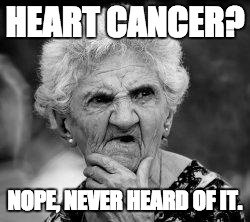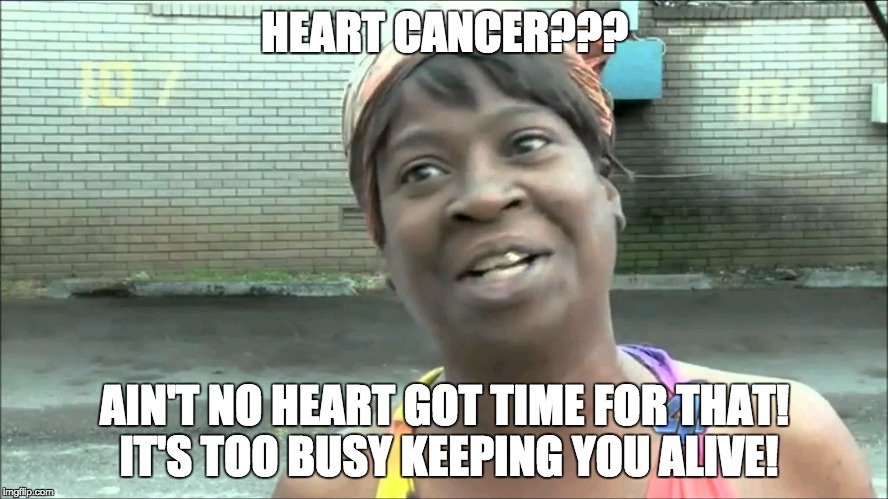Table of Contents (click to expand)
Cancer is caused by cells replicating and dividing at an uncontrolled rate. Heart cells generally don’t Replicate and divide often, so it’s hard for cancer to take hold in the heart. Other parts of the body, such as the skin, stomach, and breast, are more susceptible to cancer because the cells in those areas replicate more rapidly and frequently.
Finding out that you or a loved one has cancer is an impossibly hard moment in life. Cancer has become a modern, gradual plague, and in its various forms, kills more than 8 million people every year. Another 15 million new cases are also discovered each year. Massive research efforts have improved treatment options and our understanding of the condition, but battling cancer is still a brutal and taxing fight.
Some of the most common forms of cancer are breast cancer, lung cancer, prostate cancer, thyroid cancer, melanoma, pancreatic cancer, but there is one important organ that is oddly missing from the list… the heart! Have you ever met anyone with heart cancer? Probably not. Does heart cancer even exist?

Short answer: In fact, heart cancer does exist, but it is extremely rare. The reason for this is that heart cells do not often replicate, is why you don’t see much cancer of the heart muscle.
The Nasty Nature Of Cancer
While many people simply recoil when they hear the word “cancer” and hope it doesn’t happen to them, it is still important to know what the disease is all about, and understand the actual mechanism on a cellular level. The body usually has a control system in place that eliminates older, poorly functioning cells and replaces them with new, healthy cells. In some cases, however, this doesn’t occur, and the cell continues to grow and multiply, eventually forming abnormal cells that do not serve their initial purpose. These cells can continue to multiply, disrupting the function of nearby cells, stimulating further mutations and measurably impacting organ systems.
Cancer can be triggered through the actions of free radicals, the dangerous byproducts of cellular respiration that can stimulate the mutation of healthy cells, rendering them cancerous or changing their function. When those abnormal or mutated cells grow out of control, a large mass of tissues can form, called a tumor (although not in all cases, such as leukemia). There are five main types of cancer – carcinomas, sarcomas, leukemia, lymphoma and CNS – and are divided based on where in the body the cancer arises.
Now, while cancer in certain organs is more common than in others, cancer can actually be found anywhere in the body; it is simply easier to develop in some places. Since cancer is “spread” through cellular division at a rapid, uncontrolled rate, an organ composed of cells that are programmed to continually regrow and replace is more susceptible to cancer than one that doesn’t have such a high regeneration rate. With that in mind, let’s consider the heart…
Also Read: What Are Stem Cells And Why Are They Important?
A Very Busy Organ
When it comes to organs that have a lot of work to do, it’s hard to ignore the heart, which starts beating long before we’re born and will continue to do so until the day we die. There is no break for our heart, as it must constantly pump, flush and push blood throughout our veins, arteries and capillaries to ensure proper function of every organ and muscle.
With such a 24/7/365 type responsibility in the body, the heart doesn’t have time to continually shed old cells and replace them with new ones. (Source) There simply isn’t time for that, so heart cells generally stick around unless there is some sort of damage to those tissues that needs to be fixed. As mentioned above, cancer spreads and manifests through cellular replication and division; in an organ that doesn’t replace itself particularly often, it’s very hard for cancer to take hold.

On the other hand, many other parts of the body, such as the skin, stomach, inner lining of the colon, breast and are continually losing cells and replacing them. The digestive process of food can be brutal and highly acidic, and just think about how many times you rubs dry skin off your hands or arms. Even breast tissue swells and shrinks based on hormonal activity in the body. These types of cancer (skin, breast, colon etc.) are more common because cells in these areas of the body replicate more rapidly and frequently. Furthermore, they are more directly exposed to carcinogens, such as radiation from suntanning on the skin and the various cancer-causing agents that we consume or breathe in (lungs).
The heart is rarely exposed to these types of carcinogens, making heart cancer even more difficult to develop. So… if it’s nearly impossible for heart cancer to occur, why does it exist at all?
Also Read: Why Doesn’t The Heart Get Tired?
The Invasion Of Cancer
Research has shown that roughly 34 people in 1,000,000 have a form of heart cancer, which is typically broken up into two categories: primary or secondary tumors of the heart. Malignant tumors (primary) are typically sarcomas, which is the type of cancer that forms in the body’s soft tissues. These are extremely rare, but the mortality rate is very high. Benign tumors forming in the heart are much more common, and while not ideal, they likely won’t kill you.
The more likely way of developing heart cancer is through a secondary tumor of the heart, namely when cancer spreads to the heart or the lining of the organ from another part of the body. When cancer metastasizes, it spreads to one part of the body or organ from its initial starting point. In some cases, lung cancer can spread to the heart, due to their close proximity, but cancer can also be sent to the heart via the bloodstream. Metastatic forms of kidney, lung and breast cancer, as well as lymphoma, melanoma and leukemia, are the most common types that can spread to and affect the heart. Despite the fact that heart cancer is extremely rare, the survival rate is about 50% after Year 1, so it should be taken very seriously… and appreciated.
Now, the next time someone denies that heart cancer exists, simply because they’ve never known anyone to have it, spread some of this newfound awareness about our constantly pumping pal!
How well do you understand the article above!

